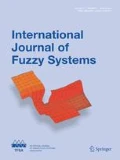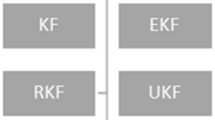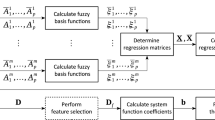Abstract
To achieve the state estimation of uncertain nonlinear systems, this paper proposes a novel optimal robust observer via the fuzzy bound information of the uncertainty. A robust observer scheme is first proposed to guarantee the uniform boundedness and uniform ultimate boundedness of the state estimation system regardless of the actual value of the uncertainty. To optimize the observer gain, a fuzzy set-theoretic-based optimal approach is then proposed by utilizing the fuzzy information of the uncertainty bound. The optimization problem is completely solved in analytic form. The resulting observer is able to guarantee the robustness of the state estimation system to the uncertainty, while minimizing an optimization index related to the state estimation performance and the observer cost. The novelty of this research is a creative optimal robust observer design by blending state estimation theory, fuzzy set theory, and optimization theory into an integrated framework.









Similar content being viewed by others
References
Luenberger, D.: Observers for multivariable systems. IEEE Trans. Autom. Control 11(2), 190–197 (1966)
Chu, H., Gao, B., Gu, W., Chen, H.: Low-speed control for permanent-magnet DC torque motor using observer-based nonlinear triple-step controller. IEEE Trans. Ind. Electron. 64(4), 3286–3296 (2017)
Samadi, M.F., Saif, M.: State-space modeling and observer design of Li–Ion batteries using Takagi–Sugeno fuzzy system. IEEE Trans. Control Syst. Technol. 25(1), 301–308 (2017)
Zhang, K., Jiang, B., Shi, P.: Fault estimation observer design for discrete-time Takagi–Sugeno fuzzy systems based on piecewise Lyapunov functions. IEEE Trans. Fuzzy Syst. 20(1), 192–200 (2012)
Li, H., Gao, Y., Shi, P., Lam, H.K.: Observer-based fault detection for nonlinear systems with sensor fault and limited communication capacity. IEEE Trans. Autom. Control 61(9), 2745–2751 (2016)
Chadli, M., Karimi, H.R.: Robust observer design for unknown input Takagi–Sugeno models. IEEE Trans. Fuzzy Syst. 21(1), 158–164 (2013)
Lin, Y.P., Lin, C.L., Suebsaiprom, P., Hsieh, S.L.: Estimating evasive acceleration for ballistic targets using an extended state observer. IEEE Trans. Aerosp. Electron. Syst. 52(1), 337–349 (2016)
Li, S., Yang, J., Chen, W.H., Chen, X.: Generalized extended state observer based control for systems with mismatched uncertainties. IEEE Trans. Ind. Electron. 59(12), 4792–4802 (2012)
Nademi, H., Das, A., Norum, L.E.: Modular multilevel converter with an adaptive observer of capacitor voltages. IEEE Trans. Power Electron. 30(1), 235–248 (2015)
Tong, S., Sui, S., Li, Y.: Fuzzy adaptive output feedback control of MIMO nonlinear systems with partial tracking errors constrained. IEEE Trans. Fuzzy Syst. 23(4), 729–742 (2015)
Comanescu, M.: Design and implementation of a highly robust sensorless sliding mode observer for the flux magnitude of the induction motor. IEEE Trans. Energy Convers. 31(2), 649–657 (2016)
Shi, P., Liu, M., Zhang, L.: Fault-tolerant sliding-mode-observer synthesis of Markovian jump systems using quantized measurements. IEEE Trans. Ind. Electron. 62(9), 5910–5918 (2015)
Barrau, A., Bonnabel, S.: The invariant extended Kalman filter as a stable observer. IEEE Trans. Autom. Control 62(4), 1797–1812 (2017)
Gdaim, S., Mtibaa, A., Mimouni, M.F.: Enhanced fault-tolerant control of interior PMSMs based on an adaptive EKF for EV traction applications. IEEE Trans. Fuzzy Syst. 23(3), 644–655 (2015)
Mwasilu, F., Jung, J.W.: Observer design for stochastic nonlinear systems via contraction-based incremental stability. IEEE Trans. Power Electron. 31(8), 5746–5758 (2016)
Xu, J.Q., Chen, Y.H., Guo, H.: A new approach to control design for constraint-following for fuzzy mechanical systems. J. Optim. Theory Appl. 165(3), 1022–1049 (2015)
Zadeh, L.A.: Fuzzy sets. Inf. Control 8, 338–353 (1965)
Boulkroune, A., Tadjine, M., M’Saad, M., Farza, M.: Design of a unified adaptive fuzzy observer for uncertain nonlinear systems. Inf. Sci. 265(5), 139–153 (2014)
Li, Y., Tong, S., Li, T.: Hybrid fuzzy adaptive output feedback control design for uncertain MIMO nonlinear systems with time-varying delays and input saturation. IEEE Trans. Fuzzy Syst. 24(4), 841–853 (2016)
Li, Y., Sun, K., Tong, S.: Observer-based adaptive fuzzy fault-tolerant optimal control for SISO nonlinear systems. IEEE Trans. Cybern. (2018). https://doi.org/10.1109/TCYB.2017.2785801
He, W., Dong, Y.: Adaptive fuzzy neural network control for a constrained robot using impedance learning. IEEE Trans. Neural Netw. Learn. Syst. 29(4), 1174–1186 (2018)
Yeh, S.J., Chang, W., Wang, W.J.: Unknown input based observer synthesis for uncertain Takagi–Sugeno fuzzy systems. IET Contrpl Theory Appl. 9(5), 729–735 (2015)
Corless, M., Tu, J.: State and input estimation for a class of uncertain systems. Automatica 34(6), 757–764 (1998)
Hui, S., Zak, S.H.: Observer design for systems with unknown inputs. Int. J. Appl. Math. Comput. Sci. 15(4), 431–446 (2005)
Klir, J.G., Yuan, B.: Fuzzy Sets and Fuzzy Logic Theory and Applications. Prentice Hall, New York (1995)
Wang, L.X.: A Course in Fuzzy Systems and Control. Prentice Hall, New York (1997)
Corless, M.: Control of uncertain nonlinear systems. J. Dyn. Syst. Meas. Control 115(115), 362–372 (1993)
Leitmann, G.: One approach to the control of uncertain dynamical systems. Appl. Math. Comput. 70(2), 261–272 (1995)
Corless, M., Leitmann, G.: Continuous state feedback guaranteeing uniform ultimate boundedness for uncertain dynamic systems. IEEE Trans. Autom. Control 26(5), 1139–1144 (1981)
Chen, Y.H.: On the deterministic performance of uncertain dynamical systems. Int. J. Control 43(5), 1557–1579 (1986)
Khalil, H.K.: Nonlinear Systems. Prentice Hall International Inc, Upper Saddle River (2002)
Hale, J.K.: Ordinary Differential Equations. Wiley, New York (1969)
Chen, Y.H.: A new approach to the control design of fuzzy dynamical systems. J. Dyn. Syst. Meas. Control 133(6), 061019 (2011)
Bronshtein, I.N., Semendyayev, K.A.: Handbook of Mathematics. Van Nostrand Reinhold, New York (1985)
Hwang, C.L., Hsu, J.C.: Nonlinear control design for a Hammerstein model system. IEE Proc. Control Theory Appl. 142(4), 277–285 (1995)
Chen, Y.H.: Performance analysis of controlled uncertain system. Dyn. Control 6(2), 131–142 (1996)
Acknowledgements
This work was supported by National Natural Science Foundation of China (Grant No. 51707004), Aeronautical Science Foundation of China (Grant No. 2016ZC51025), the Fundamental Research Funds for the Central Universities (Grant No. YWF19BJJ183), and Shanghai Aerospace Science and Technology Innovation Foundation.
Author information
Authors and Affiliations
Corresponding author
Appendix: Mathematical Preliminary About Differential Inequality
Appendix: Mathematical Preliminary About Differential Inequality
Definition 2
(see [32]) Let \(\omega (\psi ,t)\) be a scalar function of the scalars \(\psi\), t in some open connected set \({\mathcal {D}}\). The function \(\psi (t)\), \(t\in [t_0,{\bar{t}}]\), is called the solution of the differential inequality
on \([t_0,{\bar{t}}]\) when \(\psi (t)\) is a continuous function on \([t_0,{\bar{t}}]\) and \({\dot{\psi }}(t)\) should meet the inequality (78).
Theorem 3
(see [32]) Let\(\omega (\phi ,t)\)be continuous on an open connected set\({\mathcal {D}}\in \mathbf{R }^2\)and such that the initial value problem for the scalar equation
has a unique solution. If\(\phi (t)\)and\(\psi (t)\)are the solution of (79) and (78) on\(t_0\le t\le {\bar{t}}\), respectively, and\(\psi (t_0)\le \phi (t_0)\), then for each\(t\in [t_0, {\bar{t}}]\), \(\psi (t)\le \phi (t)\).
Remark
Due to the uniqueness of the solution to (79), this theorem implies the feasibility of exploring the upper bound of the solution to the differential inequality (78).
Theorem 4
(see [36]) Consider the differential inequality (78) and the differential equation (79). Let\(\omega (\cdot )\)denote a continuous function satisfying theLipschitz condition
for all points\((\nu _1,t),(\nu _2,t)\in {\mathcal {D}}\)and the constant\(L>0\). For each\(t\in [t_0, {\bar{t}}]\), the function\(\psi (t)\)meet the following inequality
if\(\psi (t)\)meets the inequality (78).
Rights and permissions
About this article
Cite this article
Xu, J., Fang, H., Zeng, F. et al. Robust Observer Design and Fuzzy Optimization for Uncertain Dynamic Systems. Int. J. Fuzzy Syst. 21, 1511–1523 (2019). https://doi.org/10.1007/s40815-019-00646-6
Received:
Revised:
Accepted:
Published:
Issue Date:
DOI: https://doi.org/10.1007/s40815-019-00646-6




